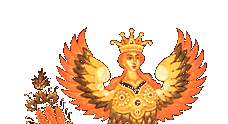During the reign of Tsar Alexis (1645-76), the Russian government was in desperate financial straits. Attempting to improve matters by debasing the silver coinage with copper in 1656 only led to inflation, further financial dislocation, and the huge "copper coin riot" of 1662. But the greater and more memorable rebellion of the time was led by Stepan (or Stenka as he was popularly known) Razin from 1670-1671. Razin was the commander of a band of Don Cossacks who gained initial notoriety by leading raids into Persia and other lands along the Caspian Sea and the lower Volga River. His band of Cossacks roamed the countryside and robbed wealthy travelers and landlords. They also had a fleet of majestic boats in which they sailed the rivers so they could pillage surrounding villages.
In the spring of 1670, Razin began a more ambitious undertaking, moving up the Volga and proclaiming freedom from officials and landlords. His voice was heard, and he was joined by native tribes and the Russian masses. Razin advanced up the river, massacring members of the upper classes, and welcoming the common people. Although his supporters grew to 20,000 strong, the movement was plagued by poor organization and lack of discipline, which helped the regular Moscow troops defeat them. Razin escaped back to the Don, but in the spring of 1671 he was seized by Cossack authorities and handed over the Muscovite officials to be publicly executed.
Although not the first revolutionary in Russia, Razin became a folk hero, inspiring other rebellions, such as the famous uprising led by the Don Cossack Emelian Pugachev. His deeds were also remembered during the Bolshevik revolution of 1917. Razin was remembered by the Russian people in tales, stories, and art, including the song about him, below.
On one of his more vigorous raids Stenka captured the gorgeous Persian Princess, with whom he immediately fell in love. Although things were well for a while, Razin's continual doting on the princess caused his men to stir, and rumors began that Stenka was becoming soft and weak. These rumors grew to the threshold of mutiny, and Razin, in order to prove his strength, without precursor stood, lifted the maiden over his head, and cast her overboard to the fate of the Volga. This move shocked his men to such an extent, that they never again doubted his leadership. But the pain must surely have remained within Razin because of that loss. The song tells the tale...
From beyond the wooded island
To the river wide and free,
Proudly sail the arrow-breasted
Ships of Cossack yeomanry.
On the first is Stenka Razin
With a princess at his side,
Drunken, holds a marriage revel
With his beautiful young bride.
But behind them rose a whisper,
"He has left his sword to woo;
One short night, and Stenka Razin
Has become a woman too!"
Stenka Razin hears the jeering
Of his discontented band,
And the lovely Persian princess
He has circled with his hand.
His black brows have come together
As the waves of anger rise,
And the blood comes rushing swiftly
To his piercing, jet-black eyes.
"I will give you all you ask for,
Life and heart, and head and hand,"
Echo rolls the pealing thunder
Of his voice across the land.
"Volga, Volga, mother Volga,
Deep and wide beneath the sun,
You have never seen a present
From the Cossack of the Don.
And that peace might rule as always
All my free-born men and brave,
Volga, Volga, mother Volga,
Volga, make this girl a grave."
With a sudden, mighty movement,
Razin lifts the beauty high,
And he casts her where the waters
Of the Volga move and sigh.
Now a silence like the grave sinks
To all those who stand to see,
And the battle-hardened Cossacks
Sink to weep on bended knee.
"Dance, you fool, and men, make merry!
What has got into your eyes?
Let us thunder out a chanty
Of a place where beauty lies."
From beyond the wooded island
To the river wide and free,
Proudly sail the arrow-breasted
Ships of Cossack yeomanry.
|



